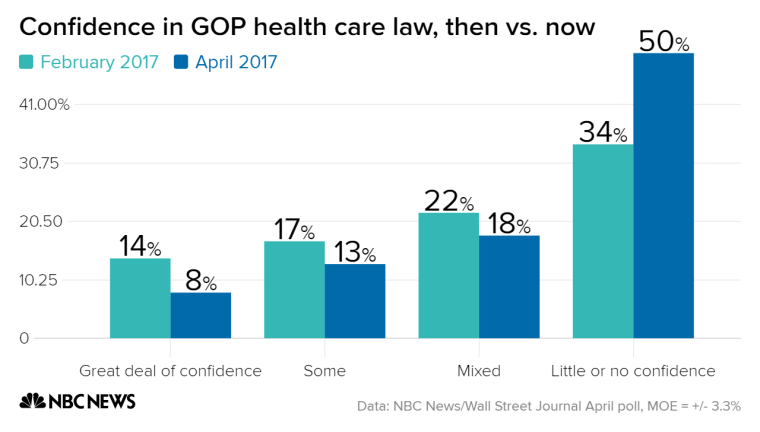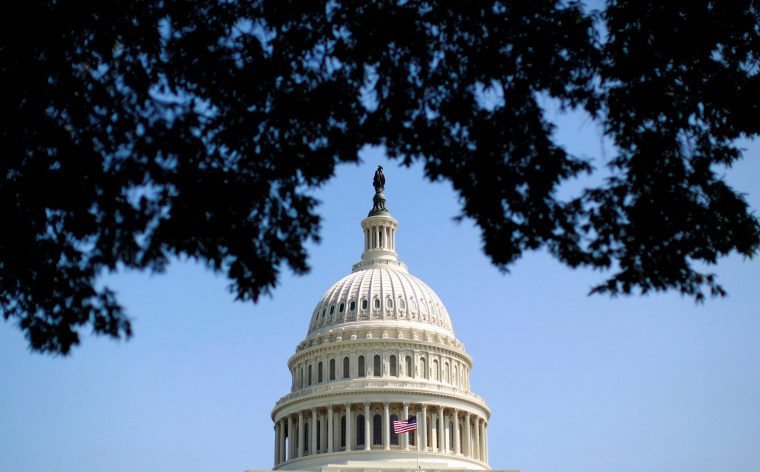First Read is your briefing from Meet the Press and the NBC Political Unit on the day's most important political stories and why they matter
House Republicans now on the cusp of passing their health care bill
If at first you don’t succeed, try, try again. And that’s precisely what House Republicans have done as they’ve scheduled a vote today on their effort to replace and replace Barack Obama’s Affordable Care Act — and they are in a MUCH BETTER position to pass it out of the House than they were a day ago. So what happened? Yesterday, a handful of House GOP critics of the legislation, led by Rep. Fred Upton (R-MI), introduced an amendment that aims to help those with pre-existing conditions “by adding $8 billion for five years to help people with long-term health issues afford care,” NBC’s Leigh Ann Caldwell and Alex Moe write. “Health care experts, however, say the amount is too little to address the needs, and several patient advocacy groups have come out against the bill.”
Afterwards, the GOP opponents on NBC’s whip count moved from 21 (they can afford only 22 defections) to 16 now. That Upton amendment came after another change, by Rep. Tom MacArthur (R-NJ), won over conservative House Freedom Caucus members by allowing states to waive out of regulatory standards that could affect those with pre-existing conditions. An important note: The Congressional Budget Office has yet to weigh in on these changes (so we don’t know how much they cost and impact the overall legislation), and there hasn’t been a single congressional hearing on them.
The 16 Republicans who are against the renewed House health-care bill (it was 21 yesterday):
- Charlie Dent (R-PA)
- Patrick Meehan (R-PA)
- Leonard Lance (R-NJ)
- Ileana Ros-Lehtinen (R-FL)
- Barbara Comstock (R-VA)
- Frank LoBiondo (R-NJ)
- Ryan Costello (R-PA)
- Dan Donovan (R-NY)
- Andy Biggs (R-AZ)
- Chris Smith (R-NJ)
- Thomas Massie (R-KY)
- Brian Fitzpatrick (R-PA)
- Walter Jones (R-NC)
- Mark Amodei (R-NV)
- John Katko (R-NY)
- Jaime Herrera Beutler (R-WA)
Per HuffPost’s Matt Fuller, there are another three House Republicans who are leaning no (Mario Diaz-Balart, David Joyce, Michael Turner), and there are 14 who are undecided (Justin Amash, Paul Cook, Carlos Curbelo, John Faso, Darrell Issa, Steve Knight, Erik Paulsen, Bruce Poliquin, Peter Roskam, Ed Royce, Elise Stefanik, Rob Wittman, Kevin Yoder, Don Young). So all it takes is for seven of these 17 lean nos/undecided to defeat the legislation.
Yet the legislation faces more formidable challenges going forward
But if the bill passes the House, remember that’s always been the EASY part. The next challenge would be the U.S. Senate, where GOP conservatives (Rand Paul, Ted Cruz) and moderates (like Susan Collins and Lisa Murkowski) aren’t on the same page. And if somehow the Senate passes its own bill, then the House (with its different Freedom Caucus and more moderate Tuesday Group factions) will have to conference with the Senate (and its Paul/Cruz vs. Collins/Murkowski splits). And on top of it all, the Senate parliamentarian will have to approve that the Senate changes don’t violate the budgetary “Byrd Rule.”
What the Congressional Budget Office previously concluded about the House GOP health-care effort
- It would reduce the deficit by $150 billion over 10 years (down from $337 billion in an earlier estimate)
- 14 million more Americans would be uninsured by 2018, and that number would rise to 24 million by 2026
- Average premiums for single policyholders would be 15%-20% higher in 2018-2019 than under current law. And by 2026, average premiums would be roughly 10% lower than under current law
Looking at the polling on the GOP health bill
The April 2017 NBC/WSJ poll found 50% of Americans saying they had little to no confidence that the GOP legislation would make things better (up from 34% who said this in February). That’s compared to a combined 21% who said they had a “great deal” of confidence or just “some” confidence. The NBC/WSJ poll also showed a combined 51% saying that Barack Obama’s health-care law was working well or needs only minor modifications, versus a combined 47% who said it needs a major overhaul or must be completely eliminated. And asked if Republicans should continue their push to repeal and replace the Obama law, 40% said yes, 37% said no, and 21% had no opinion.

NYT: House health-care bill could impact special-education funding
“School districts rely on Medicaid, the federal health care program for the poor, to provide costly services to millions of students with disabilities across the country. For nearly 30 years, Medicaid has helped school systems cover costs for special education services and equipment, from physical therapists to feeding tubes. The money is also used to provide preventive care, such as vision and hearing screenings, for other Medicaid-eligible children,” the New York Times writes. “The new law would cut Medicaid by $880 billion, or 25 percent, over 10 years and impose a “per-capita cap” on funding for certain groups of people, such as children and the elderly — a dramatic change that would convert Medicaid from an entitlement designed to cover any costs incurred to a more limited program.”
More: “Under a little-noticed provision of the health care bill, states would no longer have to consider schools eligible Medicaid providers, meaning they would not be entitled to reimbursements.” By the way, Vox reports that the legislation that the House votes on TODAY exempts members of Congress from the MacArthur amendment allowing states waive out of the ban on pre-existing conditions. MacArthur says he’ll close this loophole — but in separate legislation.
Trump to ease restrictions on political activity by churches and charities
The New York Times: “President Trump on Thursday will ease restrictions on political activity by churches and charities, White House officials said, but has backed away from a broader religious liberty order that would have allowed faith-based organizations and companies to avoid serving or hiring gay people... Mr. Trump’s executive order on political activity, which he will sign while hosting conservative religious leaders, tries to overcome a provision in the federal tax code that prohibits churches and other religious organizations from directly opposing or supporting political candidates. Officials said Mr. Trump will direct the Internal Revenue Service to exercise “maximum enforcement discretion” so that religious organizations and other nonprofit groups are not subject to punishment for expressing political views during campaign seasons.”



